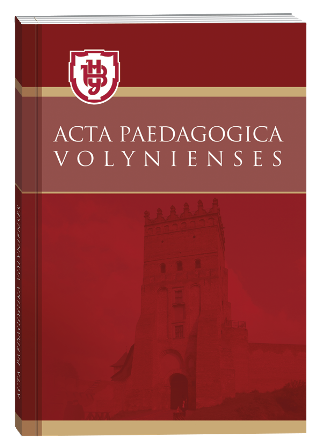THE WAYS OF FORMING PROJECT-MODELLING COMPONENT OF FUTURE PRIMARY SCHOOL TEACHERS' METHODICAL COMPETENCE
DOI:
https://doi.org/10.32782/apv/2021.6.14Keywords:
methodical competence, projective and modelling activity, future primary school teacher, project of the lesson, interactive educational technologies, constructive methodical tasksAbstract
The article is devoted to the search for directions of future primary school teachers’ projective-modelling component of the methodological competence formation. It is noted that today this problem in the theory and practice of vocational education is of particular importance, as the implementation of the tasks facing the New Ukrainian School largely depends on the teacher’s competence. The purpose of the article is to study the trends in the future primary school teachers’ methodological competence formation, highlighting the essence and ways in which they gain experience in design and modelling activities. Based on the analysis of theoretical sources, the essence of the teacher’s methodological competence and its design and modelling component is revealed. It is noted that the effective development of this component is possible only with the formation of normative, variable, partial-methodical, control-evaluation and technological components, as they are all implemented during the working out the lesson project in the form of its outline. The main results of the study are to identify the most effective ways to form a design and modelling component of the primary school teachers’ methodological competence. Namely, the introduction of interactive learning technologies (cooperative learning, group learning, situational modelling, discussion issues) and solving analytical and design tasks. Conclusions and discussions. The formation of the design and modelling component of the primary school teachers’ methodological competence has a powerful potential for the professional competence development and is a component of his professional training content. The organization of cooperative and collective-group training, situational modelling, elaboration of discussion questions and solving analytical and constructive methodical tasks during formation the designmodelling component of methodical competence allow: to reproduce real situations, the analysis of which allows students to synthesize and transform theoretical knowledge at the lectures; to teach students to make optimal decisions, to be independent in choosing the ways of their work and students’ activities, to creatively interpret their knowledge and skills in the methodology of teaching mathematics, which creates a basis for the methodical thinking development; to acquire students a general way of design activities, namely: to perform a system of actions that allows to think consciously, reasonably and creatively through the logic of the lesson or its fragment, set goals, select the content, appropriate techniques and ways of organizing students’ activities in the classroom.
References
Заяц Ю. Использование методических задач для подготовки студентов к проектированию уроков математики. Начальная школа, 2004. № 7. С. 123–127.
Нова українська школа: порадник для вчителя / Під заг. Ред. Бібік Н.М. Київ: ТОВ «Видавничий дім «Плеяди», 2017. 206 с. [Електроний ресурс]. URL: https://nus.org.ua/wp-content/uploads/2017/11/NUSH-poradnyk-dlyavchytelya.pdf
Скворцова С. Проєктувально-моделювальна складова методичної компетентності вчителя математики. Дидактика математики: проблеми і дослідження: міжнародний збірник наукових робіт / редкол.: О.І. Скафа; Донецький нац. ун-т; Інститут педагогіки АПН України; Національний пед. ун-т ім. М.П. Драгоманова. Донецьк, 2013. Вип. 40. 288 с. С. 201–206.







